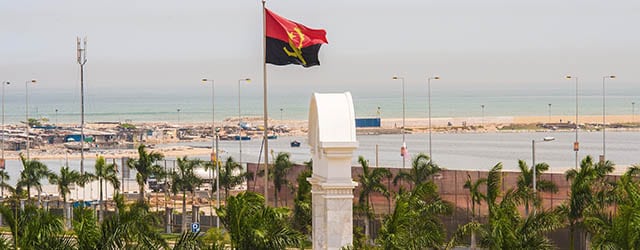Country Report | Angola

As economic growth slows and the country’s financial coffers move from surplus to deficit, Angola is rethinking its dependence on “black gold.”
For Angola, Africa’s second-largest oil producer, the fall in the price of crude oil has brought changes to its fundamentals, prompting the government, investors and analysts to review their positions on the economy. State revenue has fallen and could fall further if oil continues its downward movement, with dire implications.
“In the short to medium term, Angola may have to struggle with a weakening current-account deficit, lower fiscal revenue and likely cuts in government spending,” says Abiola Rasaq, head of research and strategy at Lagos-based financial institution Associated Discount House. During this period, foreign investors will be cautious because of the deterioration in the current account, which does not look like it will be improving any time soon, Rasaq adds.
Standard Bank holds a similar position on the country. “We anticipate that the current account will be placed firmly into deficit territory in 2015, given the sharp decline in oil export revenue,” Stephen Bailey-Smith, head of Africa research at Standard Bank, wrote in an African Markets Revealed report released in January. Angola’s current-account deficit will stand at 8.9% of GDP this year, declining to 3% in 2016, from a surplus equivalent to 1.3% of GDP in 2014, says Bailey-Smith.
We anticipate that the current account will be placed firmly into deficit territory in 2015, given the sharp decline in oil export revenue.
~ Stephen Bailey-Smith, Standard Bank
These projections are in sharp contrast to Angola’s experience of the past few years. Buoyed by high oil revenue, the country enjoyed a robust current-account surplus that rose steadily from 2010 to 2012, according to World Bank figures. The current-account surplus as a percentage of GDP was 12.6% and 12% in 2011 and 2012, respectively, which enabled Angola to accumulate foreign reserves. Economically speaking, Angola has been one of Africa’s leading performers. Up until 2013, GDP grew by an average rate of 10.7%, reaching an all-time high of 23.2% in 2007. After falling in the subsequent years, it rose again—to 6.3% in 2013, according to the World Bank. The multilateral attributed the rise to the country’s agricultural sector and to investments in the electricity sector. However the rate of economic growth decelerated to 4.4% in 2014, according to government estimates, with the decrease blamed on declining oil production.
Angola’s economy is expected to grow by just 3.5% this year, says Rasaq. The deceleration is likely to result from a reduction in government spending on infrastructure and social welfare to moderate the fiscal deficit, he explains. Inflation is also expected to remain in the upper single digits, based on an average of 9%, with lower government spending likely to put pressure on household disposable income and consumption, according to analysts.
TOUGH CHOICES AHEAD
Angola is Africa’s second-largest oil producer behind Nigeria, and like its West African counterpart, where the slump in oil prices forced a reconsideration of its dependence on oil, Angola now faces the challenge of having to restructure its economy to reduce its vulnerability to oil shocks. Revenue from oil and diamonds currently accounts for approximately 46% of GDP, and roughly 96% of foreign exchange earnings. But economic diversification is unlikely to happen overnight, as it requires painstaking and consistent investment in other sectors of the economy, including liberalization reforms that will enhance competition, human capital and infrastructure. Rasaq says Angola must accelerate its economic diversification toward secondary and tertiary production, which has the potential to create a higher number of jobs, unlike the relatively isolated oil sector, which has less integration with other sectors of the economy and concentrates wealth in the hands of a few elites.

The non-oil sector—notably agriculture, fisheries, manufacturing and construction—has been a major driver of economic growth in recent years. The government invested in improving infrastructure for the delivery of electricity, water and transport. Now the danger is that a protracted weakness in oil prices will constrain fiscal revenues and limit government capital expenditure, says Rasaq. He believes that concerns over Angola’s weakening current-account balance may impact foreign investment flows into the country, as the double whammy of lower oil production and oil prices hits the current-account balance.
However, Bailey-Smith does not expect the government to cut capital expenditure too sharply, given that there has already been steady progress with the national development plan. Rather, he says, authorities are likely to continue with projects that have already commenced but will deliberate more on projects planned for this year. The government may also concentrate a large portion of its expenditure on priority sectors like social projects, including education and healthcare, says Bailey-Smith.
The choices open to the government this year will be tough. Revenue estimates for 2015 were initially based on oil prices of $81 a barrel. But as the price decline persisted, the government cut its benchmark price to $40 a barrel. To appreciate the difficulty posed by this situation, one has to be reminded that in Nigeria, which is facing a similar challenge, the legislature and the executive had yet to agree on the correct oil price estimate to use in preparing this year’s national budget as of the beginning of February.
To restrain imports and stem the outflow of foreign exchange, Angola’s Ministry of Trade plans to reduce importation of products that can be produced locally in the country, says Bailey-Smith. This strategy is similar to plans by Nigeria, where the central bank governor announced in late January that it would reduce the sale of foreign currency for importation of goods that are currently produced at home.
Despite high rates of economic growth in previous years, that growth has been relatively noninclusive. Many Angolans are unemployed, says Rasaq. Unemployment currently stands at approximately 26%, with 39% of Angola’s 21.5 million people living below the poverty line, according to figures published by the African Development Bank. Rasaq says this uneven distribution of wealth is similar to that of other African countries like Nigeria and blames it on neglect of the industrial sector, weak market reforms and infrastructure, and low access to capital, which limits job creation and entrepreneurial opportunities.
He believes that recent government efforts at fixing the country’s infrastructure, with a particular focus on improving access to electricity, water and transport, will help create job opportunities. “Angola needs a more robust market and economic reforms that can improve economic freedom and the ease of doing business, with less vulnerabilities to government interference, political struggles, corruption and uncompetitive monopoly powers,” he adds.
Unfortunately, the country slid to 181 from 180 the previous year (out of a total of 189 countries) in the World Bank’s Ease of Doing Business 2015 rankings. Angola needs “sincere and continuous reforms along macroeconomic and market lines that will broaden the economic base and create much-needed jobs,” says Rasaq, adding that they must be complemented with sustained investment in infrastructure.
GFmag.com data Summary: Angola
Central Bank: Banco Nacional de Angola |
|||
|---|---|---|---|
|
International Reserves |
$33.5 billion |
||
|
Gross Domestic Product (GDP) |
$131.4 billion* |
||
|
Real GDP Growth |
2012 |
2013 |
2014* |
|
GDP Per Capita—Current Prices |
$5,964.47* |
||
|
GDP—Composition By Sector* |
agriculture: |
industry: |
services: |
|
Inflation |
2012 |
2013 |
2014* |
|
Public Debt |
2012 |
2013 |
2014* |
|
Government Bond Ratings |
Standard & Poor’s |
Moody’s |
Moody’s Outlook |
|
FDI Inflows |
2011 |
2012 |
2013* |
* Estimates
Source: GFMag.com Country Economic Report, IMF



